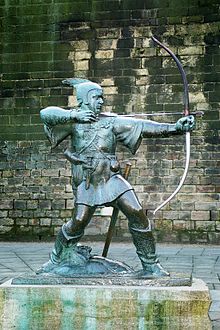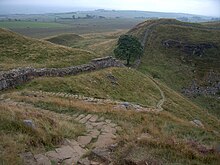
Robin Hood is a heroic outlaw and skilled archer in English folklore, known for the phrase "robbing from the rich and giving to the poor". While there is no proof he actually existed, he is one of the most powerful, enduring legends of Medieval England.
Each generation grows up with their own imagery of Robin Hood, his followers and enemies, and what they stood for. His stories have inspired at least 12 novels, 8 stage adaptations, 7 TV series, 8 films plus 8 cartoon and 9 feature-length spoofs and 7 musicals – and probably more of each since this list was compiled. Up to a million people visit Sherwood Forest each year, and it seems safe to say that very few of them come primarily to see some ancient vegetation.
Understand
edit| “ | Keep your chin up. Soon there'll be happiness in Nottingham again, you'll see. | ” |
—Walt Disney's Robin Hood | ||
There are multiple theories about Robin Hood's origins, which is another way of saying that no theory, and no historical figure, is convincing. The legend usually places him around the turn of the 12th / 13th Centuries, when King Richard I (Richard the Lionheart) was away fighting the Crusades, and his younger brother Prince John had only unofficial power as heir presumptive. The Prince became King John in 1199 and in 1215 he signed Magna Carta to head off a revolt by his Barons – so the Robin Hood legend plays into the story of the foundations of English liberty. King John died at nearby Newark in 1216 and was succeeded by his son Henry III.

From 1261 onwards, magistrates began describing villains as "Robinhood" and suchlike. In 1265 Roger Godberd rebelled against King Henry III, was outlawed and fled to Sherwood Forest with his band of followers, and battled with the sheriff. So he's a good candidate to be Robin Hood, but the name and legends may pre-date him. Ballads of the time recounted Robin's valorous deeds, the first written throwaway mention being in Piers Plowman in 1377. Over the next 200-300 years the legend expanded to absorb other Robins (e.g. Robin of Wakefield) and other characters who now became his companions. Maid Marian, for instance, appears circa 1500 as a Shepherdess May Queen, with Robin morphing into her King of May Day Festivities. The legend was effectively re-launched in 1820 by Sir Walter Scott's novel Ivanhoe, which introduced Robin of Locksley.
The Sheriff of Nottingham is a real official, but in that era his correct title (as you'd do well to remember if you were at his mercy) was the High Sheriff of Nottinghamshire, Derbyshire and the Royal Forests. His chief duties were to ensure law and order and to collect taxes. The post was traditionally shared by two men, and held for one year only, but from 1208 to 1221 it was often held solely by Philip Marc. He was deeply unpopular – "collecting taxes" may for him have meant extorting protection money, and Item 50 of Magna Carta specifically called for his removal. (Like every other Item, once the deal was signed, this was roundly ignored by all sides.) So Marc fits well as a model for the villain of legend, but there's no evidence he was much troubled by forest outlaws, unlike his successors of the 1260s.
From 1449 the duties were divided so the City of Nottingham thereafter had its own sheriff, again as a shared annual post, and from 1568 there were separate High Sheriffs for Nottinghamshire and Derbyshire. In the 19th C most of the sheriffs' duties passed to the local authority, police etc., and in other cities the post was abolished, but Nottingham has kept it on for ceremonial and tourist purposes.
Historic locations
edit
There are a number of locations associated with the legend in Nottinghamshire, Derbyshire, Lincolnshire and Yorkshire.
- 1 Sherwood Forest. Sherwood Forest was a medieval hunting forest that stretched from Nottingham to York. Now it is reduced to an area of woodland in north Nottinghamshire, around Edwinstowe, that plays host to a number of leisure facilities.
- 2 The Major Oak, near Edwinstowe. The legendary tree that sheltered Robin Hood and his band of outlaws.
- Nottingham
- 3 Nottingham Castle. (Warning: it is not a castle, but a small stately home with only the original gatehouse remaining from the castle.) Museum is a must-see and provides a fascinating insight into the history of Nottingham. The fine mansion also houses the country's first municipal art gallery and the beautifully maintained gardens are ideal for a lazy summer's day stroll. The walls around the 'castle' also offer spectacular views over the Trent valley. The famous Robin Hood statue is located just outside the castle walls.
- 4 Ye Olde Trip to Jerusalem Inn. Off Maid Marian Way - One of various pubs claiming to be the oldest pub in Britain, the "Trip" traces its existence back over 800 years. Built into the sandstone caves under the castle, it is charming and well worth a visit if you happen to be in the city. It is located at the Brewhouse Yard, home to the Museum of Nottingham Life which shows the social change in Nottingham that has occurred over the last 300 years. Dates do not quite match for the legend but as close as you will get to a tavern of the era.
- Robin Hood Statue (below the castle).
- 5 Robin Hood's Grave, Kirklees Park Estate.
- 6 Little John's Grave, St Michael and All Angels' Church (Hathersage).
- 1 Loxley, South Yorkshire. A village and a suburb of the city of Sheffield, England, one of the locations claimed as the birthplace of Robin Hood
- 1 Barnsdale (between Pontefract and Doncaster).
Movies and TV locations
editRobin Hood: Prince of Thieves
edit
The 1991 film starting Kevin Costner has a rather improbable journey to Loxley, crossing the English Channel in a rowing boat to Dover and walking in one day via a convoluted route that takes in the Seven Sister, Stonehenge and Hadrian's Wall.
Locations and attractions named after the legend
edit- 1 Doncaster Sheffield Airport (Robin Hood Airport), Doncaster.
- 2 Robin Hood Bay. Small fishing village and a bay
- 3 Robin Hood village. Village in West Yorkshire, South Leeds
- 9 Robin Hood Hills, Nottinghamshire. Steep-sided range of sandstone hills forming a natural amphitheatre surrounding the villages of Annesley and Newstead, near Kirkby-in-Ashfield
- Robin Hood Line. Railway line running from Nottingham to Worksop
- Robin Hood (train). Flagship named passenger train operated by East Midlands Trains.
- 1 Robin Hood (roller coaster), Dronten. Wooden roller coaster at Walibi Holland
See also
edit- Braveheart tourism, featuring sets from the 1995 film about William Wallace, a Scottish folk hero some decades younger than Robin Hood would be
- Medieval Britain and Ireland
- Ned Kelly tourism, featuring a similar, but very real, folk hero in colonial Australia

